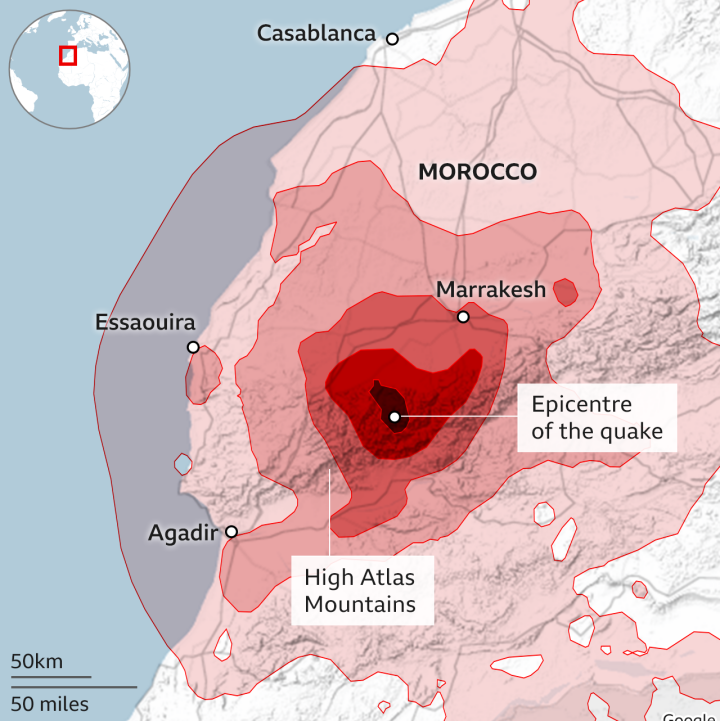Morocco is a country known for its expansive history, culture, and stirring geography. It was recently hit by an earthquake on Friday, September 8th 2023. Over 2,681 people have tragically been verified dead in the 6.8-magnitude earthquake, according to the Interior Ministry.
Most of the casualties are in the remote mountain areas, which are challenging to reach. Numerous townlets in the Atlas Mountains near Marrakesh are in ruins, with locals anxiously
awaiting aid. The Moroccan government has accepted aid from four countries, namely;
Britain, Spain, Qatar, and the UAE. More aid is expected from others. Algeria has also opened its airspace to facilitate delivery of relief materials and other support services.
Due to blocked roads filled with boulders, saviors have resorted to using their bare hands to search for survivors in the affected areas. Heavy lifting equipment struggles to pierce these remote townlets near the center. This earthquake is the most significant to hit central Morocco since records began before 1900, marking the country’s deadliest earthquake in 60 years.

In the village of Tafeghaghte, 90 out of 200 residents are verified dead, with numerous others still missing. This woeful earthquake has shaken Morocco to its core, and deliverance efforts are ongoing to give aid and support to the affected communities in this delicate time.
Some Countries Have Offered Condolences To Morocco:
Message from Rugby Africa President Herbert Mensah of Cape Town to His Majesty King Mohammed VI:
I extend my respectful greetings to Your Majesty and acknowledge the greatness of your Monarchy. I was deeply saddened to learn of the earthquake that struck the Kingdom of Morocco, resulting in hundreds of victims and damage to historic monuments and buildings in the Al Haouz region, including the renowned city of Marrakech.

During these distressing circumstances, I wish to convey, on behalf of both myself and Rugby Africa, our heartfelt condolences and unwavering solidarity with Your Majesty and the Moroccan people. Solidarity stands as a fundamental value in our beloved sport, Rugby, and it is closely intertwined with other principles such as respect and discipline, which we wholeheartedly endorse and promote within Rugby Africa. These values are deeply rooted in our diverse African cultures, both collectively and individually.
As we pray for the swift recovery of the injured, allow me, Your Majesty, to offer the following prayer: “O my God, replace my fear with security, my sorrow with joy, and my anxiety with relief, for we belong to God, and to Him, we shall return.”
Foreign Minister of Japan Mr. HAYAHI Yoshimasa, delivered the following message of condolences to H. E. Mr. Nasser Bourita, Minister of Foreign Affairs, African Cooperation and Moroccan Expatriates of the Kingdom of Morocco. “I am deeply grieved and saddened to learn, immediately after our meeting in Cairo a few days ago, that many precious lives were lost and many people were affected in the earthquake disaster in the central part of the Kingdom of Morocco. I would like to express my heartfelt condolences to those who lost their lives, and my sympathies are with their bereaved families. I sincerely pray for the quick recovery of those who are affected as well as the prompt reconstruction of the affected areas. I would like to convey to you that Japan stands ready to provide all possible assistance your country may need, based on local needs.”
Avril Benoît, executive director of MSF-USA, also gave a statement: “We are saddened by the tragic news of the earthquake in Morocco and the growing number of reported victims. MSF does not have an established presence in the country but is making contacts with local authorities, in order to send our emergency medical and humanitarian teams to assess needs and provide support if needed. Local people are the key to the initial response, when searching for survivors is vital. Earthquake survivors often require medical care such as surgery or dialysis, which can be a challenge when local health systems are affected by a disaster. Restoring health services and providing essential supplies also can be a priority at this stage. Our response will depend on the needs that are assessed on site.”
Simha Asuquo contributes from Lagos, Nigeria


Leave a Reply